Sino-Greek Civilization Dialogue Explores Ancient and Modern Wisdom
On September 18th, the "China-Greece Dialogue on Exchange and Mutual Learning of Civilizations: Harmony in Diversity, Sharing Beauty" was held with the support of the Hellenic Sinology Center at the University of Athens.
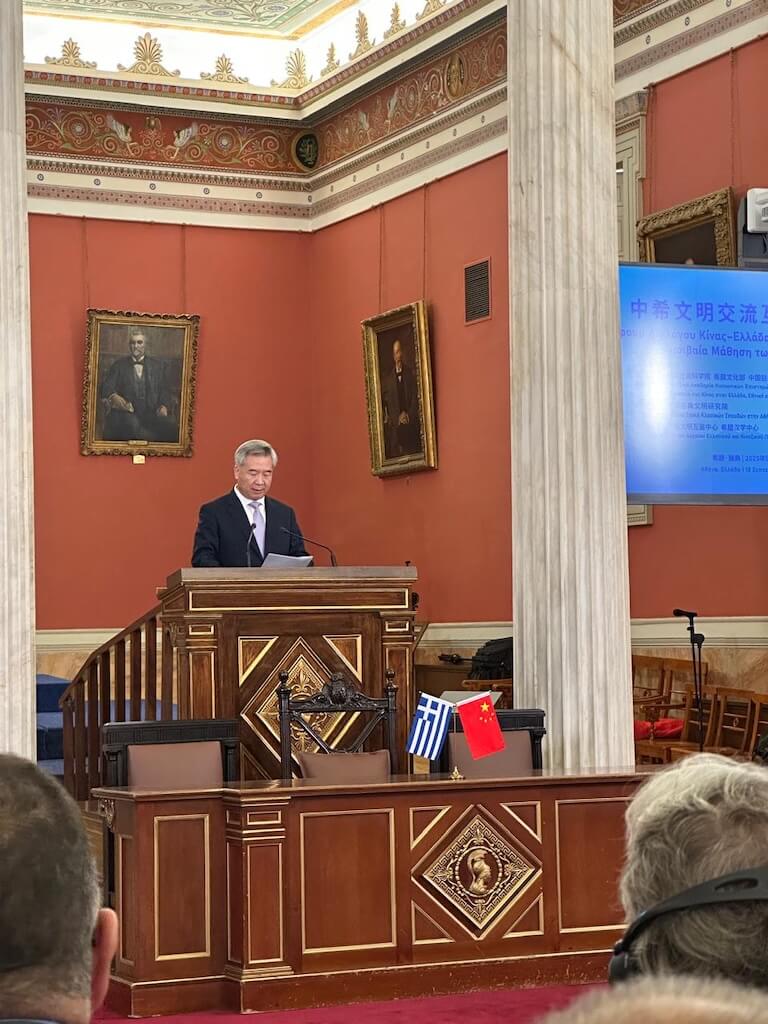
Li Xi, member of the Standing Committee of the Political Bureau of the CPC Central Committee and Secretary of the Central Commission for Discipline Inspection, attended the opening ceremony and delivered a speech. Greek Minister of Culture Lina Menzone and Rector of the University of Athens Gerasimos Siassos also attended and delivered speeches. The dialogue was hosted by the Chinese Academy of Social Sciences, the Greek Ministry of Culture, the Chinese Embassy in Greece, and the University of Athens, and organized by the Chinese Academy of Classical Civilizations. Over 200 experts and scholars from China, Greece, and the international academic community attended. The participants focused on two major themes: "Dialogue of Ancient Philosophers' Thoughts: Diverse Civilizations and Inclusive Mutual Learning" and "Dialogue of Ancient and Modern Thoughts: Inheritance, Innovation, and Progress of Civilization." Drawing on the wisdom of classical thinkers from Confucius, Mencius, the Legalists, and Taoists to Socrates, Plato, and Aristotle, they explored ethical cultivation, political governance, social order, views on nature, and cultural innovation.
In her speech, Lina Mendoni stated that both Greece and China share philosophical traditions that pursue virtue, harmony, and the public interest. These ideals, remaining vibrant from ancient times to the present day, have charted the course for social development and provided inspiration for better coping with the complex challenges of the 21st century. The Chinese Academy of Classical Civilization, a key new institution in Greece, is firmly committed to promoting dialogue among civilizations and has injected new vitality into Sino-Greek cultural cooperation. She expressed confidence that discussions at the Chinese Academy of Classical Civilization regarding recently launched archaeological projects would be highly beneficial in promoting innovation in archaeological methods and practices on both sides.
Professor Siassos stated that although separated by thousands of miles, China and Greece share close ties dating back centuries. The ancient Silk Road served not only as a route for trade but also as a channel for the exchange of philosophy, ideas, and art, leaving a rich legacy in human history. The Greek concept of "the world as an orderly whole" resonates with China's philosophy of "harmony in diversity." Today's world is rife with tensions, confrontations, and divisions, which no single nation or civilization can address. Therefore, we must revitalize dialogue among civilizations and the spirit of openness, continuously drawing on the wisdom of ancient civilizations to provide valuable lessons for building a sustainable, people-centered world.
Zhang Zhiqiang, Director of the Institute of Philosophy at the Chinese Academy of Social Sciences, and Stelios Virvidakis, Secretary-General of the China-Greece Center for Exchange of Civilizations and Professor at the University of Athens, delivered keynote speeches. Participating scholars agreed that cultural diversity is the foundation of creativity and a prerequisite for building a peaceful, just, and open world. Mutual learning and exchange between Chinese and Greek civilizations will promote cross-cultural understanding and contribute to building a community with a shared future for mankind.
The resonance of ancient and modern Chinese and Western wisdom
"Classical political thought in ancient Greece and China took shape between the 8th and 3rd centuries BC. Despite their vastly different backgrounds, these two traditions demonstrate a deep convergence in the face of social crises and the pursuit of order," said Sophia Papaioannou, Vice-Rector of the University of Athens. Plato emphasized the wisdom of philosophical rulers and the alignment of political order with the highest good, pursuing rationality, justice, and class harmony. Chinese thinkers, however, each had their own emphases: Confucianism emphasized the moral cultivation, rituals, and power of example of rulers, while Mencius emphasized the importance of the Mandate of Heaven and the will of the people; Legalism emphasized law, institutions, and the constraints of power; and Taoism advocated for non-interventionist governance, maintaining order by conforming to natural laws. These classical traditions share a common concern for leadership virtue, education, law, and social stability, reflecting the shared concern for just governance in both Eastern and Western civilizations. Plato urged the pursuit of justice, Confucianism emphasized moral example, Legalism emphasized institutional safeguards, and Taoism warned against the risks of excessive power. Through comparative studies, Chinese and Western political thought not only showcases their respective strengths but also offers cross-cultural wisdom for contemporary political philosophy and governance practice.
Philosophy is not merely a cognitive exploration but also a way of life, designed to guide people in their pursuit of a good life and moral perfection. Virvidakis argues that the two major philosophical traditions emerged almost simultaneously during the Axial Age. While differing in their conceptual systems and modes of thought, they nonetheless share many commonalities. In the realm of ethics, both philosophical traditions focus on the cultivation of character, moral virtues, and just principles of conduct, exploring the ideal leader and his relationship to society. In metaphysics, Taoist thought draws parallels with pre-Socratic philosophy in its considerations of the universe's essence, change, and opposition. The discourses of Neo-Confucianists such as Zhu Xi also echo those of Plato and Aristotle. While Chinese and Western philosophy each possess distinct characteristics, both reflect a deep concern for life, morality, and cosmic order.
Athanassios G. Platias, professor at the School of International and European Studies at the University of Piraeus in Greece, explained the similarities between China and Greece in terms of statecraft and strategic thinking. He argued that both Pericles, as described by Thucydides, and Sun Tzu and Xunzi in China, emphasized the importance of leaders maintaining a rational approach in the face of international competition, adept at weighing the pros and cons, restraining an insatiable pursuit of power and glory, and effectively guiding public sentiment. Platias believed this wisdom of "strategic restraint" embodies both the Greek concept of moderation and the ideas of ancient Chinese strategists who emphasized assessing the situation, restraining emotions, and guiding the state with foresight. This commonality across civilizations demonstrates that restraint and prudence are at the core of political leadership and key to maintaining stability and security in a turbulent international environment.
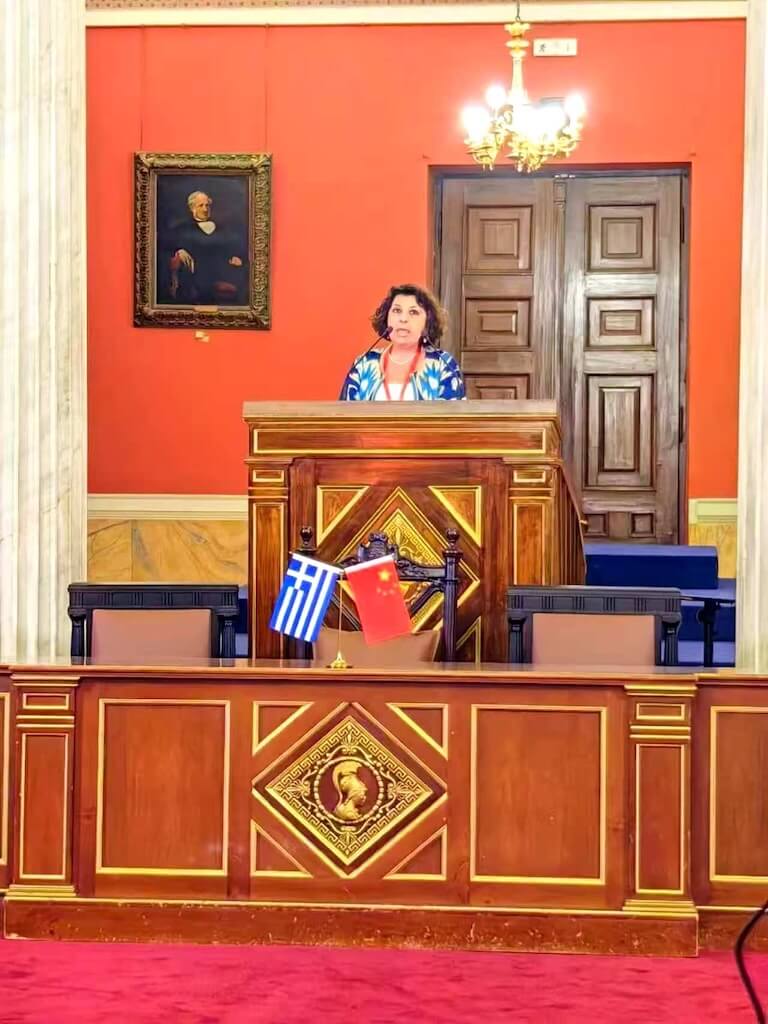
Elena Avramidou, Executive Director of the Hellenic Center for Sinology at Ionian University in Greece and a member of the UNESCO Chair's Steering Committee, believes that although Confucius and Socrates came from different civilizations and systems, they shared common ground in ethics, virtue, and education. The two thinkers, centered on social harmony and individual conscience, respectively, offered different paths for future generations to explore truth, justice, and virtue. As contemporary technology and virtual reality increasingly blur the lines between truth and fiction, the importance of education becomes even more pronounced. She called for drawing on the wisdom of both Chinese and Greek traditions to promote cross-cultural understanding and global ethical consensus, and to jointly build an inclusive and coexistent community with a shared future for mankind.
Wu Fei, a professor of philosophy at Peking University, believes that the "relationship between heaven and man," or the relationship between human civilization and the natural world, is an increasingly pressing practical issue in today's world, as well as an increasingly important theoretical question. Chinese civilization and ancient Greek civilization share a common characteristic: they both "regard nature as the highest concept, and both religious gods and civilized humans must obey nature." "Nature is not a natural world separate from human civilization, nor is it a material to be created and transformed. Rather, it encompasses the entirety of human civilization. Human civilization originates from nature and should aim to perfect nature. Only in this way can civilization avoid incurring punishment from nature and have a broader future," Wu Fei added.
Rethinking Civilization from the Perspective of Chinese Civilization
"The unique perspective of Chinese civilization offers a new path for rethinking the concept of 'civilization': civilization is not merely an institutional or symbolic system of human activity, but rather an organic community of life, whose development follows the principles of growth, nurturing, and symbiosis." Zhang Zhiqiang believes that Chinese civilization, characterized by continuity, innovation, unity, inclusiveness, and peace, embodies the two principles of "great unity" and "exhaustive adaptability." These principles emphasize a holistic view of life that emphasizes the unity of man and nature, and a historical wisdom that connects the past and present and allows for flexible adaptation. In the Chinese perspective on civilization, civilization is not merely a cultural representation but also a life practice. Through the concept of "human culture shaping the world," humans integrate their own lives with the lives of heaven and earth, achieving moral cultivation and cultural creation. This concept emphasizes cultural subjectivity and the capacity for self-renewal, allowing civilizational development to manifest as organic and continuous growth. Exchange and mutual learning between diverse cultural entities, rather than confrontation and competition, foster mutual support and moral resonance, leading to shared growth and the expansion of the civilized order. This provides unique theoretical insights for global civilizational exchange.
Yang Yanqiu, Director of the Institute of Ancient History at the Chinese Academy of Social Sciences, believes that the ancient Chinese wisdom of "harmony without uniformity" holds significant significance in the mutual learning of civilizations. She stated that "harmony without uniformity" stems from Confucius's saying, "A gentleman should be harmonious but not uniform," emphasizing respect for differences and the pursuit of unity in diversity, a core spiritual gene of Chinese culture. The pre-Qin thinker Shi Bo once noted, "Harmony creates life, while uniformity cannot continue," demonstrating that diversity and harmonious coexistence are the foundation of social and natural development. Ancient Chinese philosophy not only advocates "each thing has its own characteristics and is harmonious and unified" in its cosmological perspective, but also emphasizes "all things grow together without harming each other, and all paths run parallel without conflicting with each other" in its social perspective, demonstrating that social harmony stems from tolerance of differences. Historically, the Hundred Schools of Thought, the integration of Confucian and Legalist thought, and the interaction between the "Four Great Inventions," silk, porcelain, and Western culture all exemplify the practice of "harmony without uniformity" in promoting exchange and innovation among civilizations. She emphasized that in today's globalized context, "harmony without uniformity" provides a philosophical foundation for dialogue among civilizations, reminding countries around the world to seek consensus while respecting differences, address common challenges through cooperation, and realize the vision of a world where beauty and common prosperity exist. This is a crucial concept for resolving conflicts between civilizations and promoting the progress of human civilization.
Former Greek Foreign Minister Georgios Katrougalos stated that the Global Civilizations Initiative aims to promote dialogue among civilizations, mutual learning, and respect for diversity. It opposes the "clash of civilizations" theory through cultural heritage protection and people-to-people exchanges, enhances soft power, and promotes cooperation in a multipolar world order. China and Greece have long engaged in practical cooperation in areas such as the Forum of Ancient Civilizations and sports and human rights, setting a model for dialogue among civilizations. China's Global Governance Initiative advocates sovereign equality, adherence to international rule of law, multilateralism, a people-centered approach, and an action-oriented approach. This is a major step in supporting multilateralism and upholding the international order based on the UN Charter.
Liu Feng, researcher at the Institute of Philosophy at the Chinese Academy of Social Sciences, stated that the Chinese nation boasts a continuous civilization spanning over 5,000 years, and the fundamental reason for its sustained development and brilliant achievements lies in its innovation. This innovation stems from a fundamental principle of Chinese philosophy: the universe is in perpetual flux, and the only certainty is change itself. The Book of Changes states, "When one is exhausted, change must occur; change leads to understanding; understanding leads to endurance." Confucius also said, "Time flows like the flowing water, never ceasing day or night," reflecting the fluid and ever-changing nature of the world. Chinese philosophy not only focuses on the transformations of the universe but also emphasizes subtle changes, or "deification," highlighting the complexity and diversity of all things. This philosophy provides the foundation for the self-renewal and innovation of Chinese civilization. The spirit of "constantly renewing oneself, day by day, and again day by day" in the Great Learning, as well as the Legalist concept of "appropriate reform," have merged with the Book of Changes' philosophy of change to drive the development of Chinese civilization and form a long-standing driving force for innovation.
Contemporary Issues in the Dialogue between Chinese and Greek Civilizations
From the comradeship of Homer's epics to the friendship of the souls of Socrates and Plato and the friendship of the city-state in Aristotle; from the oracle bone inscription depicting the handshake of the character for "friend" to Confucius's proposal of "three beneficial friends," classical Chinese and Western civilizations have left behind a legacy of fraternal wisdom that connects individuals, communities, and civilizations. He Fangying, Director of the Center for the Study of Classical Civilizations at the Chinese Academy of Social Sciences, stated that in a world dominated by instrumental rationality, with increasing interpersonal alienation and the looming clash of civilizations, revisiting the classical concept of friendship is not only about rediscovering genuine friendship but also about reconstructing the logic of dialogue among civilizations through friendship, making it an "emotional code" to transcend barriers, a "thought bridge" for mutual learning among civilizations, and the "foundation of order" for the coexistence of civilizations.
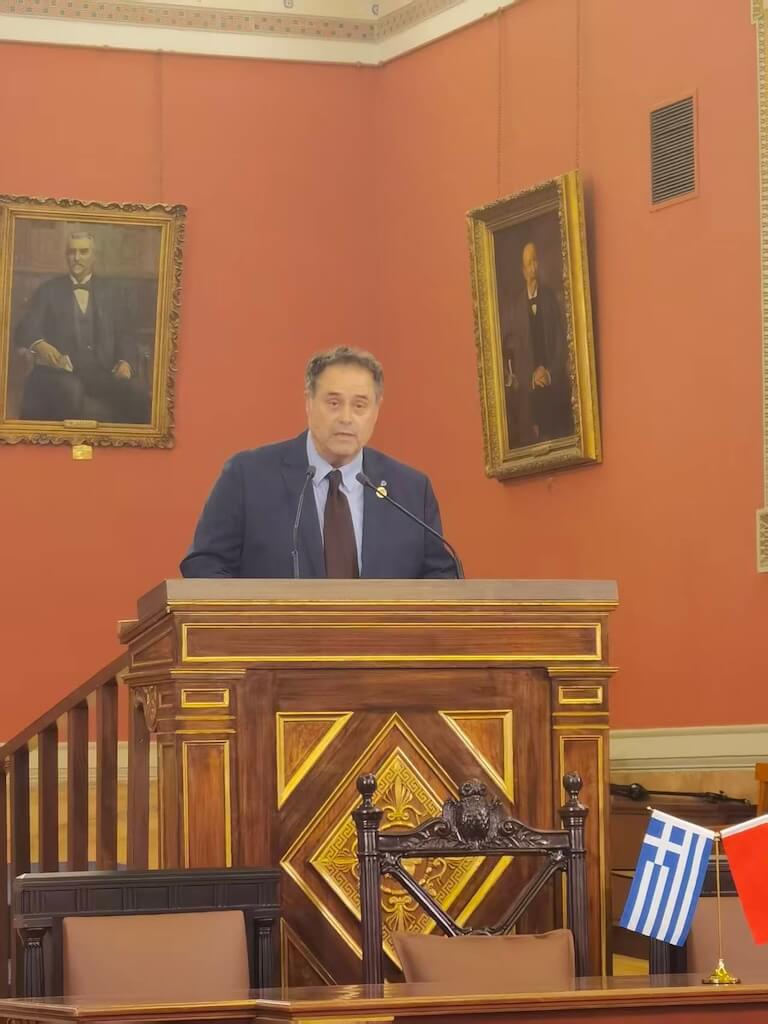
Stavros Katsios, Professor of Ionian University in Greece Director of the Hellenic Sinology Center and Chair of the Steering Committee of the UNESCO Chair in the Protection of Cultural Heritage, emphasized the dual role of digitization in cultural heritage protection. He called on the international community to take immediate action to build a secure and sustainable digital cultural ecosystem through cross-cultural cooperation and technological innovation, ensuring that humanity's cultural heritage can be shared and passed on to future generations.
Liu Wei, director of the Institute for Artificial Intelligence Governance at Renmin University of China, believes that while the rapid development of artificial intelligence has brought convenience, it has also triggered widespread "happiness anxiety," raising concerns about careers, choices, and even the meaning of hard work. Drawing on the ideas of Chinese and Western philosophers, he proposes solutions.
As important sources of world civilization, Chinese and Greek civilizations have jointly nurtured the contemporary development of world civilization. Xu Baofeng, Director of the World Sinology Center at Beijing Language and Culture University, believes that the dialogue between Chinese and Greek civilizations should not only look back to history but also be grounded in the present and look to the future. The contemporary dimensions of the dialogue encompass economics, politics, culture, science and technology, and global governance. As sources of Eastern and Western civilizations, the two countries promote mutual learning of values through cultural years, cultural heritage preservation, and educational exchanges. Under the framework of their strategic partnership, they are collaborating on the Belt and Road Initiative to promote trade, science and technology, and green development. In global governance, the two countries jointly promote multilateralism to address climate change and public health challenges. At the grassroots level, exchanges in tourism, media, and think tanks enhance social understanding. This multi-faceted interaction not only deepens bilateral relations but also provides practical experience for equal dialogue and win-win cooperation among civilizations, contributing to the construction of an inclusive and mutually beneficial international order.
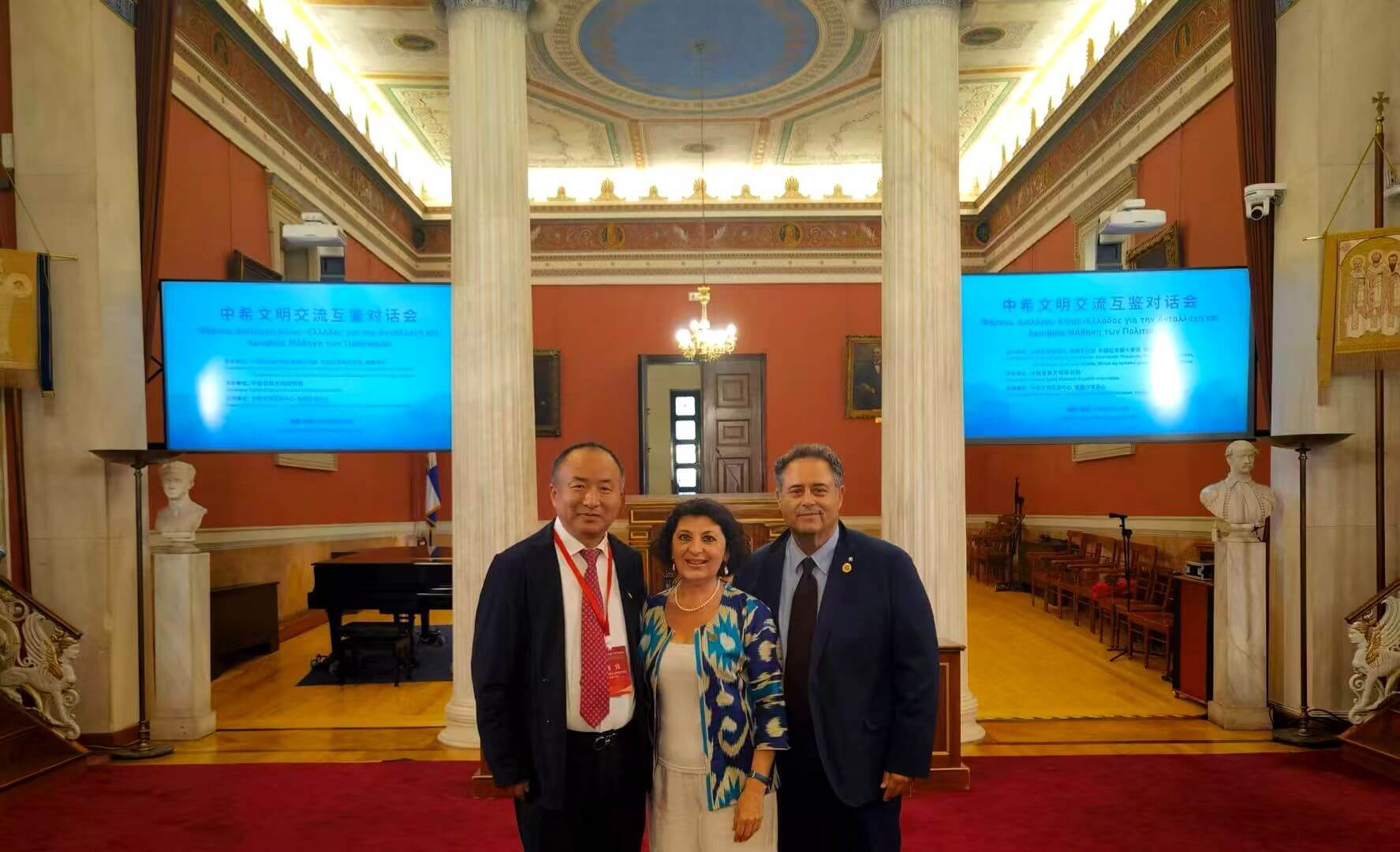


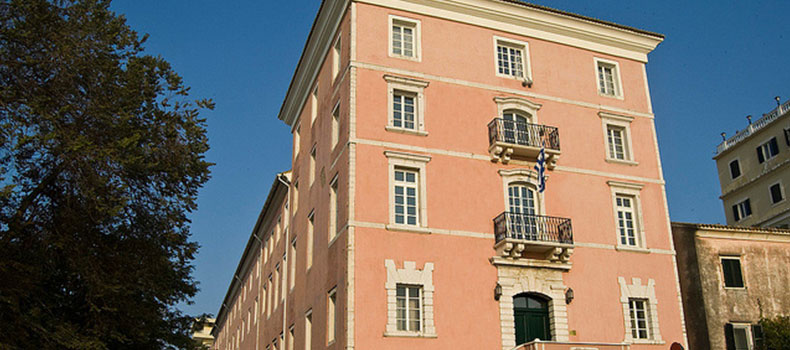
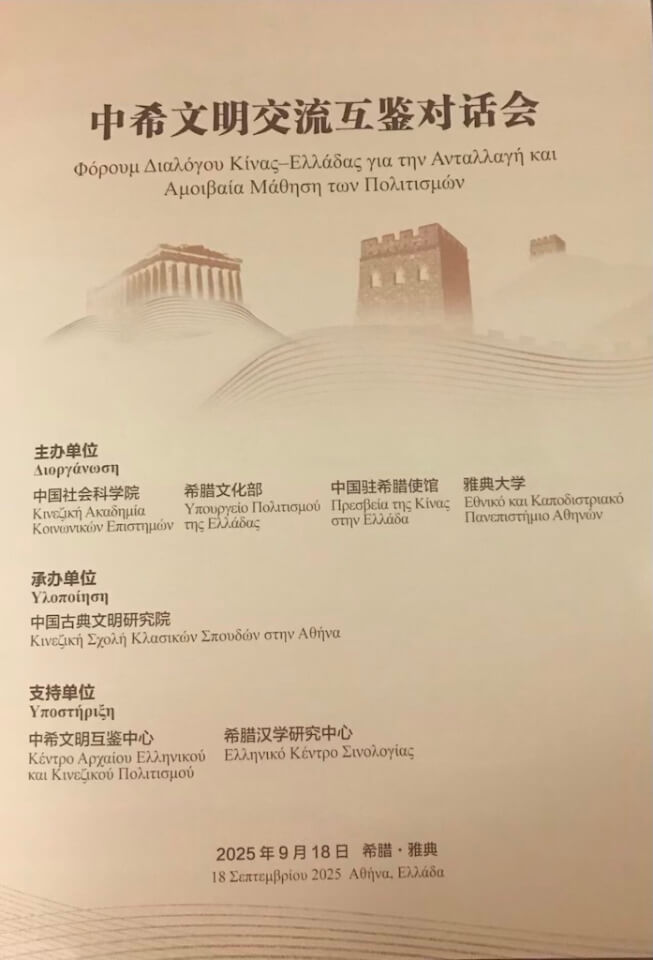

 PRESS RELEASE
PRESS RELEASE










